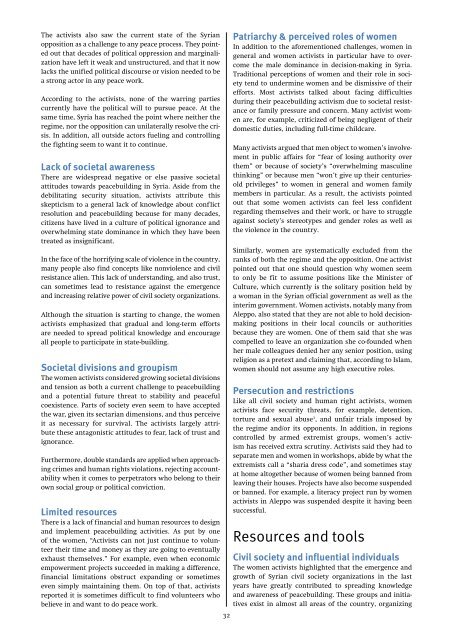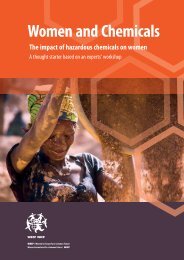future now”
YAO19
YAO19
Create successful ePaper yourself
Turn your PDF publications into a flip-book with our unique Google optimized e-Paper software.
The activists also saw the current state of the Syrian<br />
opposition as a challenge to any peace process. They pointed<br />
out that decades of political oppression and marginalization<br />
have left it weak and unstructured, and that it now<br />
lacks the unified political discourse or vision needed to be<br />
a strong actor in any peace work.<br />
According to the activists, none of the warring parties<br />
currently have the political will to pursue peace. At the<br />
same time, Syria has reached the point where neither the<br />
regime, nor the opposition can unilaterally resolve the crisis.<br />
In addition, all outside actors fueling and controlling<br />
the fighting seem to want it to continue.<br />
Lack of societal awareness<br />
There are widespread negative or else passive societal<br />
attitudes towards peacebuilding in Syria. Aside from the<br />
debilitating security situation, activists attribute this<br />
skepticism to a general lack of knowledge about conflict<br />
resolution and peacebuilding because for many decades,<br />
citizens have lived in a culture of political ignorance and<br />
overwhelming state dominance in which they have been<br />
treated as insignificant.<br />
In the face of the horrifying scale of violence in the country,<br />
many people also find concepts like nonviolence and civil<br />
resistance alien. This lack of understanding, and also trust,<br />
can sometimes lead to resistance against the emergence<br />
and increasing relative power of civil society organizations.<br />
Although the situation is starting to change, the women<br />
activists emphasized that gradual and long-term efforts<br />
are needed to spread political knowledge and encourage<br />
all people to participate in state-building.<br />
Societal divisions and groupism<br />
The women activists considered growing societal divisions<br />
and tension as both a current challenge to peacebuilding<br />
and a potential <strong>future</strong> threat to stability and peaceful<br />
coexistence. Parts of society even seem to have accepted<br />
the war, given its sectarian dimensions, and thus perceive<br />
it as necessary for survival. The activists largely attribute<br />
these antagonistic attitudes to fear, lack of trust and<br />
ignorance.<br />
Furthermore, double standards are applied when approaching<br />
crimes and human rights violations, rejecting accountability<br />
when it comes to perpetrators who belong to their<br />
own social group or political conviction.<br />
Limited resources<br />
There is a lack of financial and human resources to design<br />
and implement peacebuilding activities. As put by one<br />
of the women, “Activists can not just continue to volunteer<br />
their time and money as they are going to eventually<br />
exhaust themselves.” For example, even when economic<br />
empowerment projects succeeded in making a difference,<br />
financial limitations obstruct expanding or sometimes<br />
even simply maintaining them. On top of that, activists<br />
reported it is sometimes difficult to find volunteers who<br />
believe in and want to do peace work.<br />
32<br />
Patriarchy & perceived roles of women<br />
In addition to the aforementioned challenges, women in<br />
general and women activists in particular have to overcome<br />
the male dominance in decision-making in Syria.<br />
Traditional perceptions of women and their role in society<br />
tend to undermine women and be dismissive of their<br />
efforts. Most activists talked about facing difficulties<br />
during their peacebuilding activism due to societal resistance<br />
or family pressure and concern. Many activist women<br />
are, for example, criticized of being negligent of their<br />
domestic duties, including full-time childcare.<br />
Many activists argued that men object to women’s involvement<br />
in public affairs for “fear of losing authority over<br />
them” or because of society’s “overwhelming masculine<br />
thinking” or because men “won’t give up their centuriesold<br />
privileges” to women in general and women family<br />
members in particular. As a result, the activists pointed<br />
out that some women activists can feel less confident<br />
regarding themselves and their work, or have to struggle<br />
against society’s stereotypes and gender roles as well as<br />
the violence in the country.<br />
Similarly, women are systematically excluded from the<br />
ranks of both the regime and the opposition. One activist<br />
pointed out that one should question why women seem<br />
to only be fit to assume positions like the Minister of<br />
Culture, which currently is the solitary position held by<br />
a woman in the Syrian official government as well as the<br />
interim government. Women activists, notably many from<br />
Aleppo, also stated that they are not able to hold decisionmaking<br />
positions in their local councils or authorities<br />
because they are women. One of them said that she was<br />
compelled to leave an organization she co-founded when<br />
her male colleagues denied her any senior position, using<br />
religion as a pretext and claiming that, according to Islam,<br />
women should not assume any high executive roles.<br />
Persecution and restrictions<br />
Like all civil society and human right activists, women<br />
activists face security threats, for example, detention,<br />
torture and sexual abuse 1 , and unfair trials imposed by<br />
the regime and/or its opponents. In addition, in regions<br />
controlled by armed extremist groups, women’s activism<br />
has received extra scrutiny. Activists said they had to<br />
separate men and women in workshops, abide by what the<br />
extremists call a “sharia dress code”, and sometimes stay<br />
at home altogether because of women being banned from<br />
leaving their houses. Projects have also become suspended<br />
or banned. For example, a literacy project run by women<br />
activists in Aleppo was suspended despite it having been<br />
successful.<br />
Resources and tools<br />
Civil society and influential individuals<br />
The women activists highlighted that the emergence and<br />
growth of Syrian civil society organizations in the last<br />
years have greatly contributed to spreading knowledge<br />
and awareness of peacebuilding. These groups and initiatives<br />
exist in almost all areas of the country, organizing



